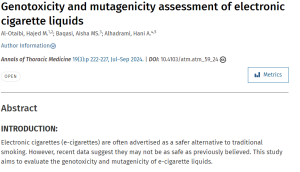U.S. college students reporting a mental illness diagnosis within the past year had a 33% higher risk of currently using e-cigarettes when compared to those without past-year mental health conditions, according to research from Truth Initiative published in the American Journal of Health Promotion.
The strongest associations between past year mental illness diagnosis and current e-cigarette use were found for schizophrenia, substance use/addiction, bipolar disorder, bulimia, and attention-deficit hyperactive disorder (ADHD). Although this study finds strong associations between mental health illness diagnosis and e-cigarette use among college students, it cannot be determined from this data whether one causes the other. Findings suggest that efforts to improve mental health among young people could also help to curb or reduce e-cigarette use, according to researchers.
This study builds on a growing body of research on the connections between nicotine use and mental health. Nicotine use has been found to harm developing brains and may make young people more susceptible to addiction. Additionally, nicotine addiction may worsen symptoms of depression and anxiety. Few studies to date have examined the relationship between e-cigarette use and mental illness symptoms and diagnoses beyond depression and anxiety.
Growing need to monitor mental health, vaping among college students
Researchers analyzed responses from the National College Health Assessment of more than 277,000 students enrolled in two- and four-year public and private universities across the U.S. between 2017 and 2019. Students were asked about their past-month e-cigarette use and if they reported mental health illness diagnosis or treatment within the past year.
One-third (34%) of respondents reported receiving a diagnosis of any mental illness within the past year, with anxiety (22.3%), depression (18.1%), and panic attacks (10.9%) ranking as the top three most common diagnoses among the sample. Across all semesters covered during this analysis, a greater proportion of surveyed college students who reported mental health conditions also reported current e-cigarette use. For example, in fall 2018, 17.2% of respondents with a mental illness diagnosis were current e-cigarette users, compared to just 11% of respondents without any report of mental illness.
Truth Initiative survey data show support for the connection: 90% of e-cigarette users who quit said they felt less stressed, anxious, or depressed. As the authors indicate, “Results suggest the need to screen young adults for e-cigarette use and mental health indicators to facilitate early detection and timely intervention for at-risk university students.”
Encouraging young people to quit vaping
Truth Initiative has worked to educate young people about the connections between mental health and vaping for the past several years, including through campaigns “Toxic Therapy from Your Vape,” “Breath of Stress Air,” and “Depression Stick.” Increased awareness of the negative impacts of nicotine addiction on mental health may be prompting young people to quit vaping. Young people are increasingly citing health and mental health concerns as their reasons for quitting vaping, according to a separate Truth Initiative study.
Get help quitting
Get free and anonymous quitting help by texting DITCHVAPE to 88709. Truth Initiative’s first-of-its-kind, evidence proven quit program, This is Quitting, has helped over 700,000 young people to date on their journey to quit vaping.
See our quit smoking and vaping tools extensive resources on quitting nicotine.
Source: Truth Initiative










